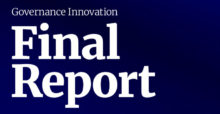This report, a joint effort between the Munk School of Global Affairs & Public Policy, the School of Cities and the Schwartz Reisman Institute for Technology and Society, stems from an initiative, launched in fall 2019, aimed at identifying, understanding, and recommending ways for local governments to more effectively respond to change. Researcher’s efforts began from the recognition that cities find themselves in the midst of a rapidly-shifting world in which there is demand for rethinking innovation through a range of governance mechanisms.
The need to identify ways to benefit from new opportunities, and at the same time protect people and place against negative impacts, is pushing cities to respond comprehensively while also demonstrating an ability to be nimble and flexible. One notable example in Toronto—the withdrawn proposal for the redevelopment of Quayside—challenged the city and its institutions to develop new approaches to governance that reflect and address technological innovation and the new information economy. Furthermore, this chapter in our city’s history is also a reminder of the need to build and sustain trust in our governing institutions. The authors believe that cities need a comprehensive reconceptualization of their approaches to governance so that they can meet the challenges of the 21st century.
Between September and November 2019, researchers hosted four meetings at the University of Toronto focused on different elements of governance innovation: management, regulation, and outcomes; data governance and the tech sector; the public realm; and transportation. The objective of each session was to convene experts around a key theme for the purpose of creating an enriched discussion focused on cities, governance innovation, and opportunities and challenges for the contemporary city.
The report that follows presents the highlights of those conversations and identifies key messages and next steps.
